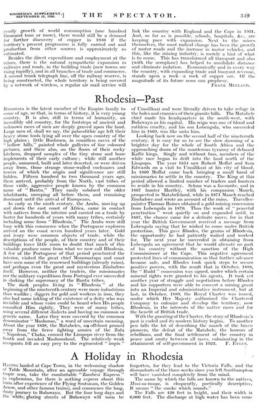Rhodes is—Past
RHODESIA is the latest member of the Empire family to come of age, so that, in terms of history, it is very young country. It is also, still in terms of humanity, an incredibly old country, for the footsteps of ancient and unknown races of men are deeply graved upon the land. Large men of, shall we say, the palaeolithic age left their heavy stone tools lying all over the open country of the high plains ; little Bushmen, in countless caves of the " hollow hills," painted whole galleries of fine coloured pictures, and there also, on the floors of their rocky kitchens, dropped samples of the tiny stone and bone implements of their early culture ; while still another people, unnamed, built and later deserted, or were driven away from, those strange stone-walled enclosures and towers of which the origin and ' significance are still hidden. Fifteen hundred to two thousand years ago, there arrived, probably from the North, vast tribes of those virile, aggressive people known by the common name of " Bantu." They easily subdued the older inhabitants, sweeping all before them, and remaining dominant until the arrival of Europeans.
AS early as the ninth century, the Arabs, moving up and down the east coast of Africa, came in contact with natives from the interior and carried on a trade by barter for hundreds of years with many tribes, certainly including some from " Rhodesia." The Arabs were still busy with this commerce when the Portuguese explorers arrived on the coast seven hundred years later. Gold and ivory were common objects of trade, while the descriptions of the people, of their country and of their buildings leave little room to doubt that much of this valuable produce came from what we now call Rhodesia. A few of the Portuguese of that period penetrated the interior, visited the great chief Monomatapa and must have seen some of the renowned buildings (already ruins), and perhaps even the great and mysterious Zimbabwe itself. However, neither the traders, the missionaries nor the military expeditions from Portugal ever succeeded in shaking the supremacy of the Bantu tribes. The dark peoples living in " Rhodesia " at the beginning of the nineteenth century were more industrious than warlike ; diggers for gold and workers in iron, they also had some inkling of the existence of a deity who was invisible and whose voice could be heard when His people consulted Him rightly. They were of no tribes, using several different dialects and having no common or generic name. Later they were covered by the common denominator " Mashonas,' a word of uncertain meaning. About the year 1838, the Matabeles, ars offshoot pruned away from the fierce fighting armies of the Zulu " Napoleon," Chaka, crossed the Limpopo river from the South and invaded Mashonaland. The relatively weak occupants fell an easy prey to the regimented " impis " of Umsilikazi and were literally driven to take refuge in the holes and crannies of their granite hills. The Matabele chief made his headquarters in the south-west, with Bulawayo as his capital. His reign was one of blood and ruthless cruelty, and his son Lobengula, who succeeded him in 1869, was like unto him.
Looking back now on the second half of the nineteenth century, it is easy for us to see the slow dawning of a brighter day for the whole of South Africa and the approaching doom of the murderous tyranny of debased Kaffir kings. Singly and without fuss, members of the white race began to drift into the land north of the Limpopo. The year 1854 saw Robert Moffat and Sam Edwards on a visit to Unisilikazi at his city of blood. In 1860 Moffat came back bringing a small band of missionaries to settle in the country. The King at this period allowed a limited number of traders and hunters to reside in his country. Selous was a favourite, and in 1867 hunter Hartley, with his companion • Mauch, prospected in Matabeleland, while in 1871 Mauch reached Zimbabwe and wrote an account of the ruins. Traveller- painter Thomas Baines obtained a gold-mining concession from Lobengula in 1870. Thus the work of " peaceful penetration went quietly on and expanded until, in 1887, the chance came for a definite move, for in that year the British Government received a message from Lobengula saying that he wished to come under British protection. This gave Rhodes, the genius of Rhodesia, the opportunity he had patiently waited and worked for. The next year he succeeded in obtaining from Lobengula an agreement that he would alienate no part of his country without the sanction of the High Commissioner at the Cape. This negative agreement protected lines of communication so that further advance became safe, and Rhodes took quick steps to secure positive powers, with the result that in October, 1888, the " Rudd " concession was signed, under which certain mineral rights were granted to his agents. It took yet another year of struggle and negotiation before Rhodes and his supporters were able to convert a mining grant into an Imperial and administrative instrument, but at last, in October, 1889, the Royal Charter was issued, under which Her Majesty authorized the Chartered Company to colonize and develop the territory, now Rhodesia, in the interests of the native races and for the benefit of British trade.
With the granting of the Charter, the story of Rhodesia's past is ended and its modern history begins. To another pen falls the lot of describing the march of the brave pioneers, the defeat of the Matabele, the horrors of rebellions, and the final settlement of the country in peace and amity between all races, culminating in the
attainment of self-government in 1923. F. EYLEg.










































 Previous page
Previous page